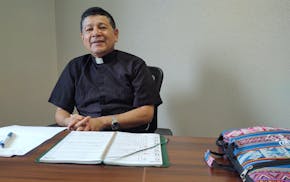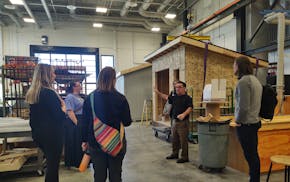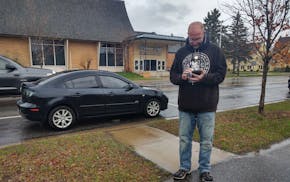ST. CLOUD - Kamala Harris supporters and Donald Trump supporters ate dinner together in a St. Cloud church on Wednesday, then talked about the election.
And nobody chucked cooked carrots at anyone.
Granted, these were Lutherans. Mostly. But the event brought together legitimately different viewpoints and political leanings: liberals, conservatives, third-party voters and people who eschew labels altogether.
The event was the most recent "Respectful Conversation" led by the Minnesota Council of Churches with the hope of counterbalancing the vitriol surrounding the 2024 presidential election. The council did something similar in 2012 prior to a referendum that would have prevented same-sex marriage had it succeeded, and it has held similar discussions since then on topics such as community policing, guns, and race relations.
This year, the council arranged for 10 discussions about the election around the state in places including Cloquet, Rosemount and St. Paul. About 120 people registered for the St. Cloud event. Attendees divided into tables of seven or eight, and while they finished up the raspberry chicken and dinner rolls, they heard advice on how to talk with people you disagree with.
Share your own beliefs and listen carefully to what other people are saying.
Don't belittle or twist anybody else's words.
Listen carefully.
Don't go on and on.
Maintain confidentiality.
Don't try to change anyone's mind.
"This will not be a time for us to be expressing criticism or to be arguing, challenging, or setting each other straight," said organizer Victoria McWane-Creek, prompting knowing laughter. It's so easy, even pleasurable, to lash out, to tell someone how wrong they are and how right you are. Yet it's so harmful, contributing to mutual loathing and fractured families.
"This is hard, hard work," McWane-Creek continued. "It really is about managing ourselves."
If anybody was wearing a MAGA hat or a Harris T-shirt, I didn't see them. The crowd seemed to tip left. There were quite a few ELCA Lutherans, who allow women to become pastors, but I didn't meet any Missouri Synod members, who don't. But some ELCA members identified themselves as conservatives, and at least one of them told me he was leaning toward Trump. There were also Presbyterians, Methodists and Catholics.
At our table, everybody except the neutral moderator supported Harris. You'd think the conversation would end there, but the moderator wanted us to dig deep. What life experiences and deeply held values influenced how we see this year's election? What were our hopes and fears?
Deep within each of us is where much of the vitriol comes from. Elections produce winners and losers. Do you have to pay more taxes? Do you have to add pollution controls to your manufacturing plant? Do you lose your choice over whether to terminate a pregnancy? Or do you long that every human could see the value of the unborn life taking shape each day? Do unauthorized immigrants get carted out of the country, leaving dairy farmers struggling to milk their cows? Will you be made to feel like a criminal for arguing that police are good? Will both sides accept the results of the election, or will we all lose as our time-honored system of free and fair elections erodes further?
If elections didn't matter, there would be no fuss. No billions of dollars spent on making us hate each other.
But it helps to take a minute and see that our hatred comes from our fears. Our compassion comes from our hopes.
At our table, people said they valued factual truth and were upset by the disinformation that has crept into so many corners of life. They valued education, and felt that Americans aren't getting a good one. Several women were retired, and they said they would never treat anyone with the disrespect they see nowadays. One said her father would pull her ear if she ever disparaged another person in his presence.
Attendees ate for free at the catered event. Those who sponsor these conversations pick up the tab, and feeding 120 people means they must really believe in what they're doing.
Chad Peterson, lead pastor at Bethlehem Lutheran Church, which hosted this week's conversation, told me that his church wants people to understand themselves better and see others as human beings worthy of love and respect.
"In a polarized country where relationships are broken over politics and family members cannot talk to each other, we want to be part of the effort to bring healing and peace," he said.
At the end of the discussion, people shared their impressions. One called it "a painfully enlightening process."
Someone else said having a respectful conversation worked well at the church, but they wondered how well it would work in the real world.
But at least, for a couple of hours, they felt heard and respected.
"I came here tense," one man told the crowd as the event wound down. "This helped calm me down."

Tolkkinen: Fergus Falls priest who studied with Pope Leo says he has good hearing 'to hear everyone'

Tolkkinen: Just when I was starting to lose myself in nature's grandeur, along came a motorcycle

Tolkkinen: On a three-day northern Minnesota tour, the grit and glory of our state became clear

Tolkkinen: Brainerd City Council should spend a night, or 30, sleeping outdoors


